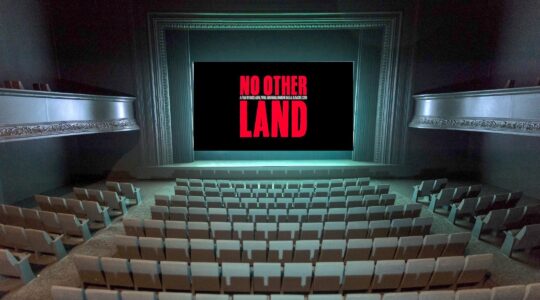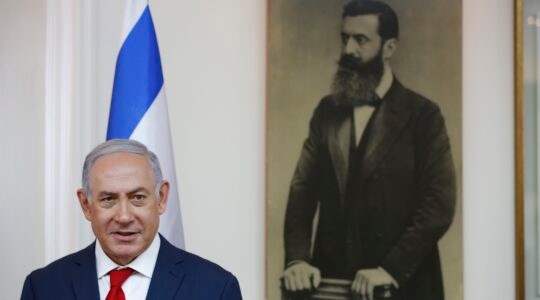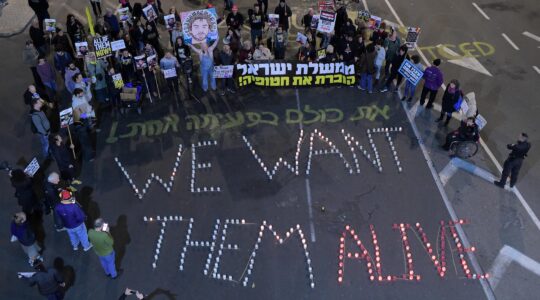JERUSALEM (JTA) – As a microcosm of the conflicts gripping the Middle East, Lebanon’s monthlong standoff over the presidency is stoking concerns in Israel.
The confrontation in Beirut between a pro-Western, mainly Sunni-Druse alliance and a pro-Syrian, Christian-Shiite coalition supported by Iran’s Lebanese proxy, Hezbollah, mirrors the power struggle between pro-Western states and an Iranian-led axis across the Middle East.
Israel fears that if the standoff in Lebanon flares into outright fighting, there could be ramifications for the entire region.
Indeed, the 34-day war between Israel and Hezbollah in the summer of 2006 reflected these same regional tensions.
Last week’s assassination of Gen. Francois Hajj, the leading contender to take over as commander-in-chief of the Lebanese army, may have brought Lebanon closer to a new round of violence.
Hajj was in line for the spot being vacated by Gen. Michel Suleiman, the pro-Syrian compromise candidate for president. The Sunni-Druse alliance said the Syrians were behind Hajj’s killing; the Christian-Shiite coalition blamed Israel.
The current tensions date back to 2004, when the Syrians insisted on a constitutional change to enable Emile Lahoud, Lebanon’s pro-Syria president, to serve for another three years.
Prime Minister Rafiq Hariri resigned in protest, the Syrians got their way and Hariri was assassinated a few months later.
The widespread condemnation of Syria for that killing – by a car bomb on Feb. 14, 2005 – spurred the rise of the rival alliances. A wave of demonstrations by Sunnis and Druse, coupled with powerful U.S.-led international pressure, forced the Syrian army to pull out of Lebanon, ending Syria’s 29-year occupation of the country.
Lahoud’s additional three-year term ended this fall, and he stepped down Nov. 23 with no successor in place. The well-respected but pro-Syrian Suleiman emerged as a compromise candidate, but a constitutional hitch keeping him from assuming office led to the political standoff.
Lebanon’s constitution requires a two-year cooling-off period before an army man can hold political office. The pro-Syrians want to waive this requirement; the other side does not.
In the meantime, Prime Minister Fuad Siniora has assumed presidential duties.
But in multidenominational Lebanon, this too is potentially explosive. Under the constitution, the president has to be a Catholic Maronite Christian, the prime minister a Sunni Muslim and the parliamentary speaker a Druse.
Christians are upset with the Sunni Siniora acting as president, with some accusing Siniora of plotting to subvert the constitution and keep the presidency for himself.
The mutual suspicion that has marked the prolonged standoff has created a tense and potentially volatile situation.
Complicating matters further is the strong presence of foreign powers in Lebanon and foreign interests in Lebanese affairs.
From an Israeli point of view, most worrisome is Iran’s increased investment in training and arming Hezbollah. Hezbollah’s annual budget has been raised to $1 billion from $400 million to compensate for losses sustained in last year’s war with Israel, and members of the Iranian Revolutionary Guard and former Hezbollah intelligence chief Imad Mughnieh have been dispatched to restructure the militia.
Iran is interested in having a strong Hezbollah rocket force to deter Israel from striking Iran’s nuclear installations or for attacking Israel if a war breaks out over Iran’s nuclear program.
Hezbollah stumbling into a war with Israel last year compromised Iran’s strategic interests by impairing Hezbollah’s rocket capabilities and raising the profile of the Hezbollah threat, which had been dormant and somewhat neglected by the Israelis over the previous few years.
While raising the popular profile of Hezbollah chief Sheik Hassan Nasrallah, the war may have cost him his authority with the Iranians. Arab media reports last week suggested the Iranians had stripped Nasrallah of his military command and handed it to his deputy, Naim Qassem.
There may be a positive message in this for Israel: The move signals that Iran does not want to see another confrontation with Israel sap Hezbollah’s resources right now. Thus, even if there is trouble in Lebanon over the presidency issue, those troubles may not spill over the border into Israel.
At the same time, Syria remains interested in maintaining its hand in Lebanon, a source of wealth and power.
In the heyday of its occupation, Syria had about 40,000 troops in Lebanon, hundreds of thousands of workers there and a tight grip on Lebanon’s economy. Syria’s presence in Lebanon also provided a strategic defense against a potential Israeli attack on Damascus through Lebanon’s Bekaa Valley.
In the long term, Syria wants to return to Lebanon, but Damascus is pursuing this goal in a low-key and measured way, says Professor Eyal Zysser, the head of Tel Aviv University’s Dayan Center for Middle Eastern Studies.
“They were flattered when the French approached them on the presidential issue and they want to help,” Zysser said. “Although they know they can’t go back in a big way yet, they want people to recognize that they still have some standing and influence in Lebanon.”
Israel’s paramount interest is stability, which could depend greatly on the Syrian role in Lebanon and the degree to which Israel is able to engage Damascus in peace talks.
The Israeli government says it is prepared to engage Syria only if the Syrians forego their alliance with Iran, end support for Palestinian rejectionists and leave Lebanon alone.
But some Israeli strategists say Israel should consider a tradeoff with the Syrians in which Syria gains control of Lebanon as part of a peacemaking quid pro quo. These strategists believe that only the Syrians would be strong enough to control Hezbollah and the other rival factions in Lebanon.
“Not only are they the only ones who can keep order there, at some point Lebanon will revert to them anyway,” Zysser told JTA.
Indeed, some Israeli strategists believe Israel committed a major blunder in supporting the ultimately successful bid by the United States and other Western countries to force the Syrian army out of Lebanon in 2005. Former Israeli national security adviser Giora Eiland called it “a serious historic error.”
On the Lebanese side, Muslims and Christians are suspicious of Israeli and Western motives.
French overtures to the Syrians and a planned follow-up to the Israeli-Palestinian Annapolis peace conference that will focus on the Israeli-Syrian track have led to fears in the Sunni-Druse alliance that the United States is using France to cut a Syria-Israel deal that would restore Syrian influence in Lebanon.
Lebanese Christians fear that as part of the Annapolis process, the United States plans to press Lebanon to resettle its estimated 400,000 Palestinian refugees – Sunni Muslims – and grant them full citizenship. That, the Christians worry, would dangerously tip the demographic balance in Lebanon against them.
For now the focus is on the presidential standoff.
“They will do all they can to avert violent clashes, and the chances are that they will manage to find a compromise,” Zysser said. “But in Lebanon, you never know. Anything can happen.”
JTA has documented Jewish history in real-time for over a century. Keep our journalism strong by joining us in supporting independent, award-winning reporting.





